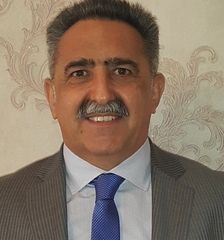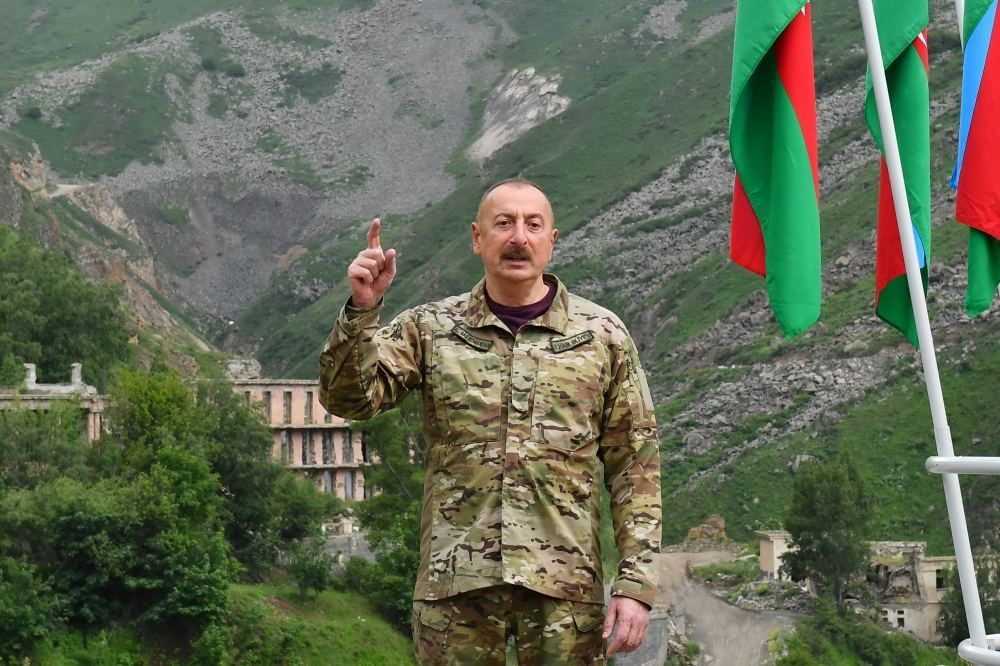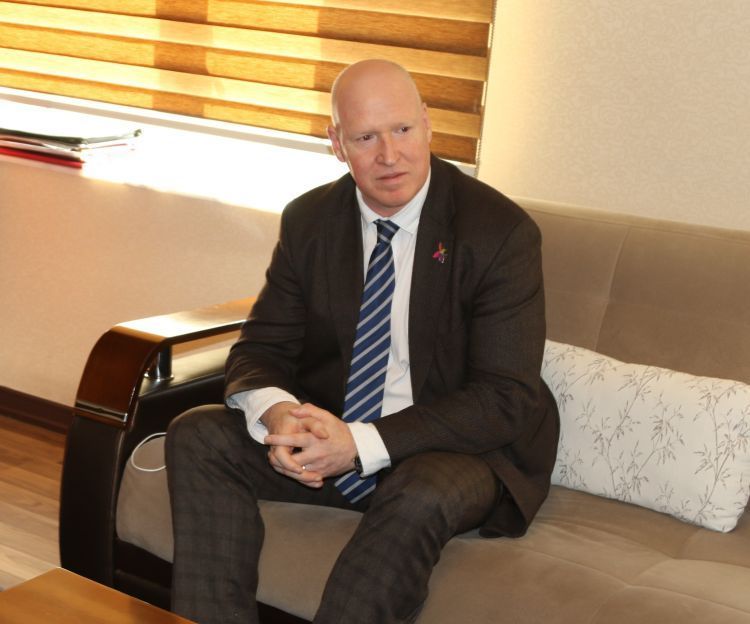Azerbaijani president's wise statesmanship, right military & political decisions pivotal in Karabakh victory [INTERVIEW]
![Azerbaijani president's wise statesmanship, right military & political decisions pivotal in Karabakh victory [INTERVIEW]](https://www.azernews.az/media/2022/11/06/632b23e351461632b23e3514621663771619632b23e35145f632b23e351460.jpg)
By Fuad Muxtar-Aqbabali
- President Ilham Aliyev's outstanding performance as Supreme Commander-in-Chief secured glorious victory
- The presence of functional state, stable government & productive economy was vital in Karabakh triumph
- Effective battle plan, well-trained military with knowledge of tasks led to hard-fought win
- Azerbaijan had highly effective statesman waging information war on the international stage
- President Ilham Aliyev Sochi statement that "the Karabakh conflict has already been consigned to history" was right
- Signs are that a treaty between Baku & Yerevan may soon be coming
Ahead of the approaching second anniversary of the Second Karabakh War, in an exclusive interview with Azernews, Dr Patrick Walsh, an Irish historian, shared his views about President Ilham Aliyev's role in the Victory; crucial elements that made it possible for Azerbaijan to liberate its own lands; etc.
Q: In your opinion, what were crucial tenets/elements that made it possible for Azerbaijan to liberate its own lands from Armenia’s 30-year-long occupation?
A: The presence of a functional state and stable government, productive economy. A cohesive national spirit within the mass of the population. An effective battle plan that utilised the most useful modern technology purchased with a view toward the task at hand. Also a well-trained military who understood the plan of the campaign. Most of all wise statesmanship that made the right military and political decisions at the vital moment.
Q: How crucial were Azerbaijan’s preparations for the liberation of the occupied lands under the direct leadership and command of President Ilham Aliyev? I mean rallying society around the need for the liberation of the occupied lands, and extended diplomatic, political, military activities coupled with the procurement of state-of-the-art weapons and closer relations with leading world armies to master their experiences.
A: Very important. All the money in the world does not create an effective military force designed to put into operation a plan that requires great coordination of effort to actually work in the test of battle. Extensive training operations alongside the Turkish Armed forces were vital. Alongside that Azerbaijan was not only fighting the Armenians. The government was aware of the possibility of some form of Russian intervention that has to be taken account of. Both pre-War diplomacy and contacts with Moscow during the war were important in managing the outcome in a controlled manner, minimising casualties for the gains made.
Q: In his pre-war speeches and interviews, referring to international laws, President Ilham Aliyev kept saying that the occupied lands would be liberated; though geopolitics, in particular, the Russian factor remained a deterring role, a few to name. What factors, in your view, prevented Russia to keep aloof from interfering in 2020 as was not the case during the 2016 four-day flare-up in Karabakh? Amicable relations between Aliyev and Putin? What else, in your opinion?
A: Azerbaijan was seen as a good neighbor by Moscow and it was important that the Aliyev government did not suffer a reverse after taking on the war. A new government with a more Western orientation was not in Moscow's interest. Yerevan never understood how the balance of power had shifted in the South Caucasus over the previous decades and that Russia was going to take account of this. There was also the fact that the Kremlin valued relations with Turkiye highly. All these factors made it in Moscow's interests to not impede Azerbaijan's progress. The only aspect that would have concerned Putin was an Armenian escalation of the war bringing about regional insecurity, or the possibility of a humanitarian disaster brought about by fighting in the main Armenian settlements. These eventuate were in the Kremlin's interest to prevent by what means it could - hence the controlled end to the war.
Q: How important was timing for the liberation of the lands? I mean, the Covid-19 pandemic was raging around, global economies were hard hit and nations were engaged in coping with those issues. However, despite all these, the Azerbaijani leader in response to Armenia’s shelling of border regions off the main theater of military operations decided to prevent the attack and started the sacred struggle for the de-occupation of the territories. Comprehensive preparations, I mean, strategic calculations, practical measures, complete reliance on pivotal societal actors, and so on were needed. Do you believe all of them and others were in place to guarantee victory?
A: The Armenians have suggested that Baku availed of certain conditions like the US Presidential elections and the Covid pandemic to utilise international distraction for a favourable time for the war. However, the Armenians with their shooting down of the peace process through a number of provocative political and military actions that brought on the war. The Tovuz incident was important in this, seemingly showing that "new war for new territories" was not just rhetoric. Internal Armenian politics, arising from the Pashinyan destabilising influence, really provoked the war at the time of Yerevan's choosing, not Baku's.
Q: Along with the Azerbaijani army liberating Karabakh from Armenia’s control, President Ilham Aliyev was also very active in defending Azerbaijan’s right to protect its internationally recognized lands in the diplomatic and media front, contacting world leaders to persuade the need for justice to be served. Looking back to those days and interviews with leading world media outlets, what would your take be?
A: Azerbaijan had a highly effective statesman waging an information war on the international stage. The quality of his interviews with the world's media was outstanding, and put Azerbaijan's case in the strongest possible light. President Aliyev confronted the West with the basic facts of international law and the just nature of the liberation war. Pashinyan floundered when he faced the Azerbaijani President both on the Russian stage and when confronted by serious Western journalists. It was vital that the information war be won because in this sphere of propaganda the Armenians had an advantage from latent sympathy in the West.
Q: The post-war processes are not unfolding as desired and Armenia is trying to avoid honoring some major items of the November 10, 2020, trilateral deal, brokered by the Kremlin though President Ilham is insisting on them. What is your assessment of Aliyev’s post-war diplomacy, in particular, his categorical statement in Sochi at the meeting with Putin that the Karabakh issue is solved, and the criticism of France for its past brutalities in Africa and for the current backing of Armenia?
A: The road to peace is a long and winding one in which there will be setbacks. Peacemaking is often more difficult than the winning of wars because it is more complex and requires political skills of the highest order. Progress has been slow but there is momentum there as long as Yerevan is held to its obligations under the agreement it signed. The insistence at Sochi that the war was over and the status of Karabakh was not an issue was the correct position. France has only been an obstructive element in the process and should not be allowed to persist with its one- sided position driven by diaspora politics and Crusader mentality. Is it any wonder the OSCE failed and the issue had to be taken to the battlefield for resolution? There are signs that a treaty may be soon coming and let us hope that is the case. Nature abhors a vacuum and conflict festers when diplomacy fails. We have seen this all too tragically in Ukraine. Let us hope that difficult decisions can be taken now to prevent future generations having to sacrifice themselves over issues that should now be settled once and for all, at the conference table.
----
Follow us on Twitter @AzerNewsAz
Here we are to serve you with news right now. It does not cost much, but worth your attention.
Choose to support open, independent, quality journalism and subscribe on a monthly basis.
By subscribing to our online newspaper, you can have full digital access to all news, analysis, and much more.
You can also follow AzerNEWS on Twitter @AzerNewsAz or Facebook @AzerNewsNewspaper
Thank you!



